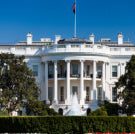The US government could be heading for another partial government shutdown later this week unless Congress can agree to a new round of spending bills.
President Joe Biden is meeting with the top congressional leaders at the White House on Tuesday in the hope of kickstarting negotiations after Senate majority leader Chuck Schumer and House speaker Mike Johnson blamed each other’s parties for stalling.
Unless new spending bills can be agreed before Friday 1 March, funding for the departments of agriculture, energy, house and urban development, transportation and veterans affairs will expire.
What’s more, the departments of justice, state and defence will in turn find themselves without cash from Friday 8 March.
While senators returned to Congress on Monday after a brief recess, their House counterparts are not due back at their posts until Wednesday evening, placing even further time pressure on the passage of any funding bills and increasing the likelihood of another stop-gap spending motion or continuing resolution becoming necessary.
Government shutdowns are a recurrent threat looming over Congress whenever the parties of the left and right cannot find common ground on how to bankroll the great offices of state.
Under the Antideficiency Act, which was passed in 1884 and amended in 1950, US government departments and federal agencies cannot spend or commit money without the approval of Congress.
The House and Senate therefore need to assess the budget requests submitted by individual departments and agencies and agree on the 12 appropriation bills that apportion a full year’s worth of funding to those offices before a given deadline, with the spending packages having to pass through both chambers before they can reach the Resolute desk to be signed off by President Biden.
If Congress passes the appropriation bills, the clock is reset for another year and everyone can rest easily.
If it cannot, those departments and agencies affected must cease all non-essential functions until a deal is in place.
If all of the dozen bills are caught up in partisan squabbling, a complete government shutdown takes place. But if some can be agreed to, leaving only a few offices required to close their doors, a partial shutdown is the result.
During federal shutdowns, government employees are told not to report for work and placed on…
Click Here to Read the Full Original Article at The Independent Travel…
